
Early signs of diabetes are easy to miss
While certain kinds of diabetes, like type 1 diabetes, can come on quickly, the most common type—type 2 diabetes—can be a slower process. Type 2 is caused by a combination of factors, including genetics and long-term eating and exercise habits. People with excess weight and a sedentary lifestyle are at higher risk of developing type 2 diabetes, but it takes time. (Read the latest on how to beat diabetes.)
“It’s not like you wake up one day and all of a sudden you’re thirsty, hungry, and [going to the bathroom] all the time,” says Melissa Joy Dobbins, RD, a certified diabetes educator in Illinois and a spokesperson for the American Association of Diabetes Educators. “It picks up gradually.” Indeed, “most people are unaware that they have diabetes in its early or even middle phases,” says Aaron Cypess, MD, PhD, investigator at the National Institute of Diabetes and Digestive and Kidney Diseases at the National Institutes of Health.
And just because you’re unaware doesn’t mean you’re immune to the problems associated with the disease. The longer you go without managing the condition, the greater your risk for diabetes-related complications including cardiovascular disease, kidney disease, amputation, vision loss, and nerve damage. That’s because the rise in blood sugar that accompanies prediabetes and type 2 diabetes often causes no symptoms at all.
“We recommend that people with risk factors for diabetes, such as a family history or being overweight, get evaluated on a regular basis,” Dr. Cypess says. If you’ve been feeling off, talk to your doctor about getting a simple blood test that can diagnose the disease. And pay attention to these subtle signs of diabetes.
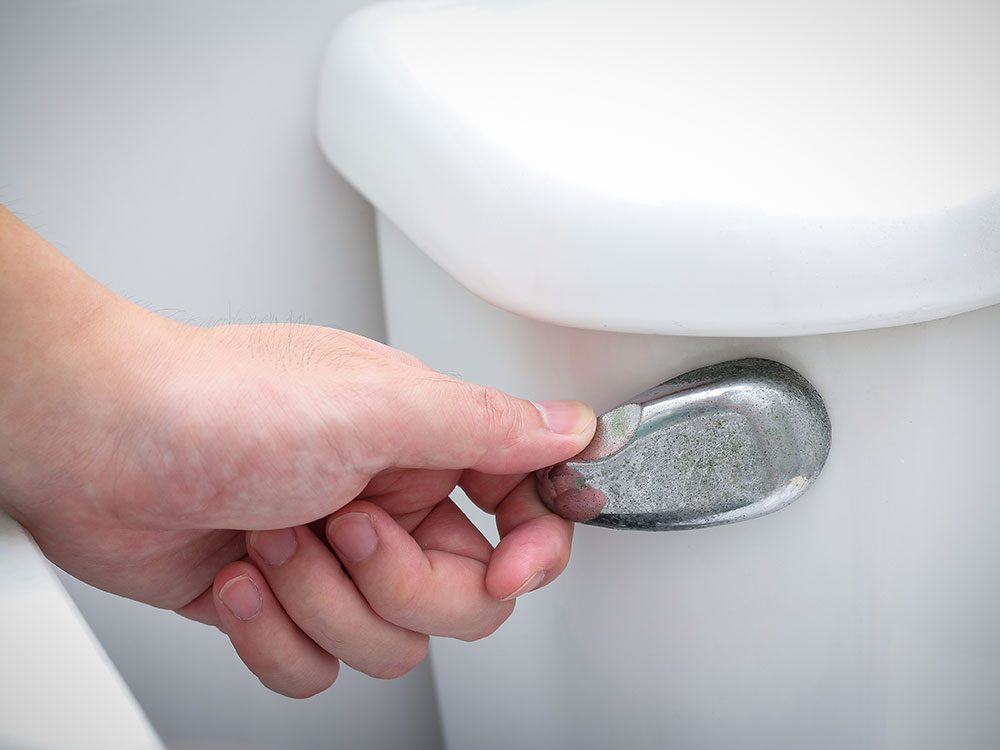
You’re taking more bathroom breaks
With type 2 diabetes your body becomes less efficient at processing blood glucose (also known as blood sugar), your body’s main source of energy. As a result, you have more sugar sitting in your bloodstream, says Dobbins. “Your body gets rid of it by flushing it out in the urine.” Going to the bathroom a lot is one of the easy-to-miss early signs of diabetes. After all, says Dr. Cypess, most people aren’t aware of how often they use the bathroom. “When we ask about it, we often hear, ‘Oh yeah, I guess I’m going more often than I used to,’ ” he says. Here’s a red flag: The need to urinate wakes you up at night. Once might be normal, but if it’s affecting your ability to sleep, that could be a diabetes symptom to pay attention to.

You’re thirstier than usual
Urinating a lot will also make you feel parched. A common symptom Dobbins sees with patients is that they use drinks like juices, soda, or chocolate milk to quench their thirst. These sugary beverages then pack the bloodstream with excess sugar, which can lead to the problem all over again.
Urinating a lot will also make you feel parched. Another one of the early signs of diabetes Dobbins sees with patients is that they use drinks like juices, soda, or chocolate milk to quench their thirst, which are some of the worst drinks for diabetics. These sugary beverages then pack the bloodstream with excess sugar, which can only worsen the problem, creating a vicious cycle.
Find out the best (and worst) drinks to keep you hydrated.
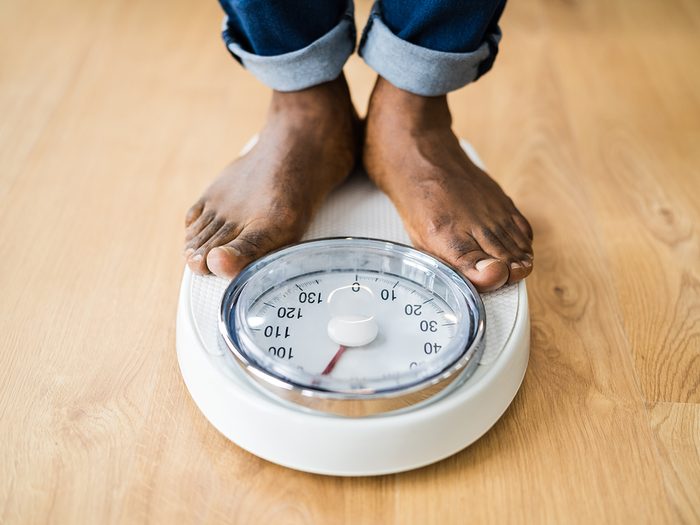
You’ve lost a little weight (without even trying)
It doesn’t make sense: Being overweight is a risk factor for type 2 diabetes, and yet shedding pounds is a sneaky symptom of the disease. What’s that about? “Weight loss comes from two things,” explains Dr. Cypess. “One, from the water that you lose [from urinating]. Two, you lose some calories in the urine and you don’t absorb all the calories from the sugar in your blood.”
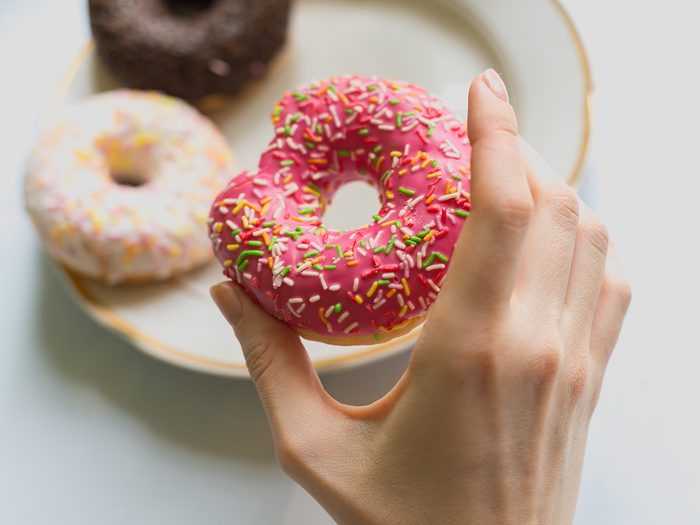
You feel hungrier than normal
Throughout the day, blood glucose levels go up (usually after you eat) and normally go down, when insulin kicks in. The problem with diabetes is that insulin is no longer working correctly and the hormone can’t transport blood sugar into the body’s muscles to be used as fuel.
This can cause you to feel hungrier than normal, but eating won’t help the problem because the energy still isn’t making it to the muscles. While you can feel shaky or hungry when blood sugar drops too low, this usually only happens if you are taking insulin or other medications that accidentally lower blood sugar too much.
Check out these sneaky things that raise your blood sugar levels.

You’re tired all the time
It’s normal to be exhausted every now and then. But ongoing fatigue is an important symptom to pay attention to; it might mean that again, the food you’re eating for energy isn’t being used by cells as it’s supposed to. “If you’re not getting the fuel your body needs, you’re going to be tired and sluggish,” says Dobbins. That constant fatigue could be an early sign of diabetes.
Check out more medical reasons you’re tired all the time.

You’re moody and grumpy
When your blood sugar is out of whack, you just don’t feel well and might become more short-tempered. In fact, high blood sugar (or hyperglycemia) can mimic depression-like symptoms.

Your vision seems blurry
When blurry vision occurs at the time of diagnosis, it’s not diabetic retinopathy, which is caused by damage to the blood vessels in the back of the eye. Instead, says Dr. Cypess, it’s more often “a sign that the lenses are getting fluid in them or out of them because the concentration of glucose in them is different from the rest of the body. The blurry vision can be a good sign since it can happen after starting treatment when the blood sugars start going down to safer ranges. The blurry vision resolves once the lenses in the eyes have gotten used to the new, lower blood sugars. In about six to eight weeks after your blood sugars are stabilized, you’re not going to feel it anymore; the eye will adjust.”
Find out how to maintain healthy eyes at every age.
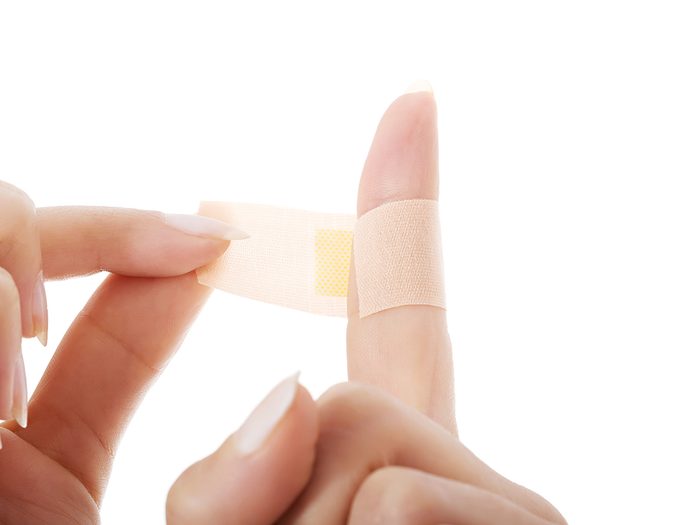
Your cuts and scrapes heal more slowly
Slow healing could be an early sign of diabetes. The immune system and the processes that help the body heal don’t work well when your sugar levels are high, explains Dr. Cypess. “The immune system has many components, and nearly all of them don’t work as well in the setting of hyperglycemia [high blood glucose],” he says. “For example, there is reduced blood flow, changes in [the acidity of blood] that hurt the immune cells, and nerve damage leading to injuries and infections.”
These daily habits can naturally boost your immune system.

Your feet tingle
Elevated blood sugar levels can cause complications well before you realize you have diabetes. One of these is nerve damage (neuropathy), which can cause numbness in your feet. Although different types of diabetic neuropathy can affect people who have diabetes, research suggests that up to half of people with diabetes have peripheral neuropathy, nerve damage that typically affects the feet and legs and sometimes affects the hands and arms, according to the ADA.
Here are 10 signs of disease your feet can reveal.
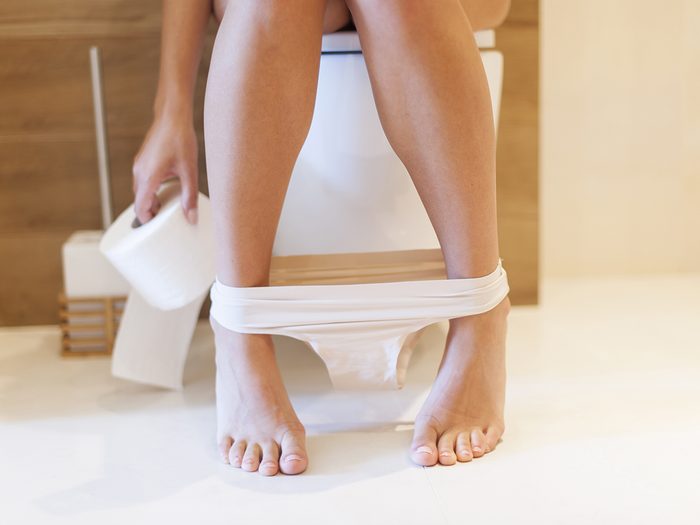
You’re more prone to urinary tract and yeast infections
Higher levels of sugar in the urine and the vagina can become a breeding ground for the bacteria and yeast that cause these infections. A study published in 2015 in The Journal of Diabetes Complications found that people with type 2 diabetes are at increased risk for urinary tract infections, as compared to those who don’t have diabetes. Recurrent infections are particularly worrisome.
Now that you the signs of diabetes to watch for, check out 20 symptoms you should never ignore.